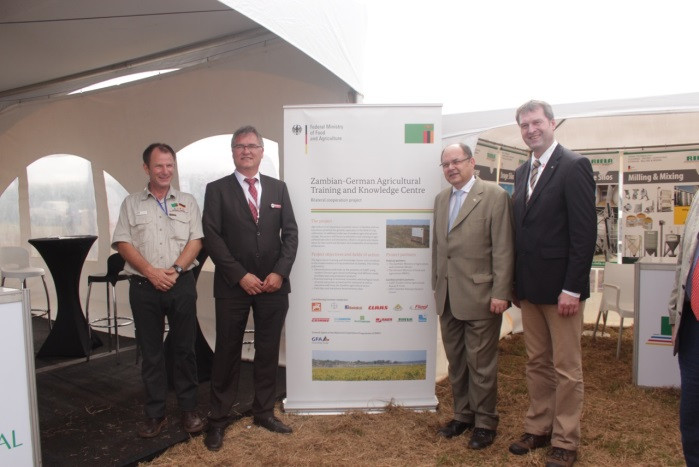
AFC together with its partners DLG International, DEULA Nienburg and IAK Agrar Consulting Leipzig is implementing the Zambian-German Agricultural Knowledge and Training Centre since 2014. The project is financed under the Bilateral Cooperation Programme of the German Ministry of Food and Agriculture (BMEL).
The project is situated 70 km north of Lusaka on the premises of the Golden Valley Agricultural research Trust (GART). GART and the Zambian National Farmers Union (ZNFU) are the local partners of the AKTC, in addition 12 German Agribusiness Partners are supplying machinery, seeds and plant protection inputs for the project.
An experienced core team of three long-term experts from Germany, Zimbabwe and Zambia is working towards the achievement of the project goal to develop the centre into a well-known training institution in the region, offering practical trainings in crop production under irrigation and on farm mechanisation. On approx. 80 ha of land, provided by the project partner GART, the team has implemented a number of trials and demonstrations over the past three years. Apart from the practical training carried out on these demonstration fields, they also serve the purpose to inform farmers in the region: during farmer meetings (Indabas), special demonstration days and field days different production systems in regard to soil preparation, fertiliser and plant protection strategies and the choice of adapted varieties and sowing quantities are discussed. Emphasis is always given to sustainable, soil conserving and water saving production methods.
Trainings are mainly offered to emergent farmers and students and lecturers from the University of Zambia, the Natural Resource Development College and the Chipembi College of Agriculture. Following a request from the Ministry of Agriculture, the project will now also offer trainings to Ministry extension officers.
During the first three years of the project, the team has laid a solid foundation for the second phase. The AKTC is a well -known and appreciated training institution in the region, fitting very well into the new Zambian Agricultural Policy which will put special focus on agricultural mechanisation and climate-smart sustainable agricultural production. The new project phase, starting in August 2017, will concentrate on a more targeted approach to the training needs of market oriented farmers and an increased addressing of multipliers (e.g. extension officers) that are to roll out training activities also to smaller farmers. Towards the end of the second phase, the sustainability of AKTC beyond the project duration will be assessed and steps forward will be prepared.
For further infromation, please contact Tesa.weiss [at] afci.de or Helmut.Anschuetz [at] afci.de
